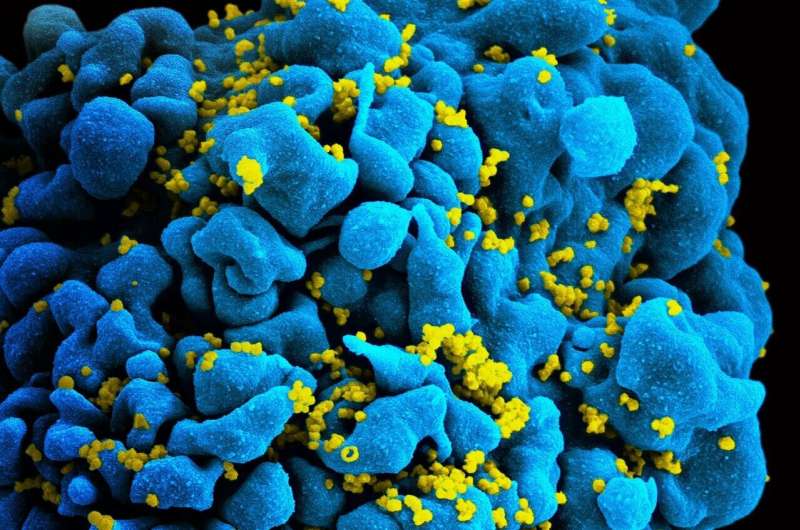Scanning electromicrograph of an HIV-infected T cell. Credit: NIAID
Metformin, a drug used to treat type-2 diabetes, could help reduce chronic inflammation in people living with HIV (PLWH) who are being treated with antiretroviral therapy (ART), according to researchers at the University of Montreal Hospital Research Centre (CRCHUM).
Although ART has helped improved the health of PLWH, they are nevertheless at greater risk of developing complications related to chronic inflammation, such as cardiovascular disease. These health problems are mainly due to the persistence of HIV reservoirs in the patients' long-lived memory T cells and to the constant activation of their immune system.
In a pilot study published recently in EBioMedicine (URL), Université de Montréal immunology professor Petronela Ancuta and first author Delphine Planas, a Ph.D. student in her laboratory at the CRCHUM, evaluate the ability of metformin to improve immune function and reduce viral reservoir size.
We asked Professor Ancuta to explain the study.
Q. Despite the use of antiretroviral therapy, seropositive individuals exhibit immune activation and excessive inflammation. In your study, you try to stop that with metformin. How so?
Currently, antiretroviral therapies inhibit HIV replication by preventing the entry of virion (a complete viral particle) into new cells and its exit from infected cells. However, one step is still not targeted by these therapies: the multiplication of the viral genome inside the infected cell.
Despite antiretroviral therapy, this intracellular viral multiplication causes chronic inflammation and immune activation, leading to the emergence of co-morbidities such as cardiovascular disease. In the laboratory, we are working to identify new treatments to inhibit intracellular viral multiplication.
The idea of using metformin in people living with HIV came from Dr. Jean-Pierre Routy of the Research Institute of the McGill University Health Centre, our collaborator in this study. Used widely in medicine, this drug stimulates or inhibits the reactions of the body's immune system.
In our study, knowing that metformin interferes with the activity of the mTOR (mechanistic target of rapamycin) molecule involved in the intracellular multiplication of HIV genome, we used the drug to treat 22 nondiabetic PLWH on antiretroviral therapy (13 in Montreal and nine in Ottawa). In vitro, studies by our group and others had previously demonstrated that inhibiting mTOR with drugs inhibits HIV replication considerably in the cells of patients infected by the virus.
Q. Did the results of your study surprise you?
Yes, we were excited by the positive results of this pilot study. The drug was extremely well tolerated by the patients and we observed the beneficial biological effects of metformin in colon biopsies.
HIV hides in CD4 T cells, immune system cells that shelter the virus and form viral reservoirs in various peripheral tissues such as the intestine. The virus continues to multiply in these reservoirs and leads to inflammation.
In the study, we observed a reduction in the activation of mTOR in CD4 T cells present in the colon, as well as a decrease in certain plasma markers of inflammation and intestinal damage. Metformin, then, has both intestinal and systemic effects.
Q. HIV reservoir size is linked to the level of inflammation. Could new approaches like yours reduce the size of these reservoirs? Did you observe this in your study?
The viral DNA reservoir size in peripheral blood T cells and in the colon was pretty stable, which is consistent with the known stability of HIV reservoirs. However, we expect that longer treatment may lead to a reduction of these reservoirs. This hypothesis is worth testing.
Q. Will you continue your research with a larger patient sample?
We're going to launch a new randomized study on more than 58 participants in which metformin will be administered over a longer period. We're planning to do it over a six- to 12-month period to validate the benefits of metformin in controlling inflammation, in part by regulating mTOR.
To conclude, I would like to thank the participants in the LILAC study for donating their biological samples and believing in our research efforts, which came to fruition thanks to close collaboration with many researchers, particularly the teams of Drs. Jean-Pierre Routy and Maged Peter Ghali (McGill University Health Centre), Nicolas Chomont (CRCHUM) and Dr. Jonathan Angel (Ottawa Hospital Research Institute).
More information: Delphine Planas et al, LILAC pilot study: Effects of metformin on mTOR activation and HIV reservoir persistence during antiretroviral therapy, EBioMedicine (2021). DOI: 10.1016/j.ebiom.2021.103270
Journal information: EBioMedicine
Provided by University of Montreal Hospital Research Centre























